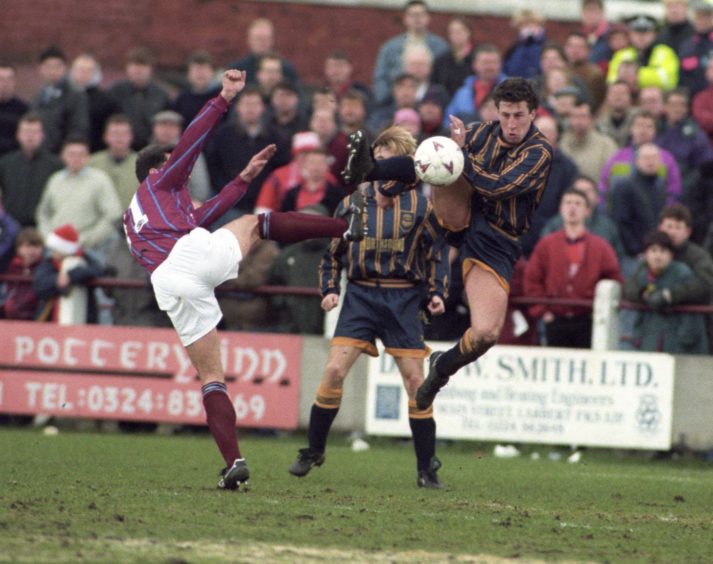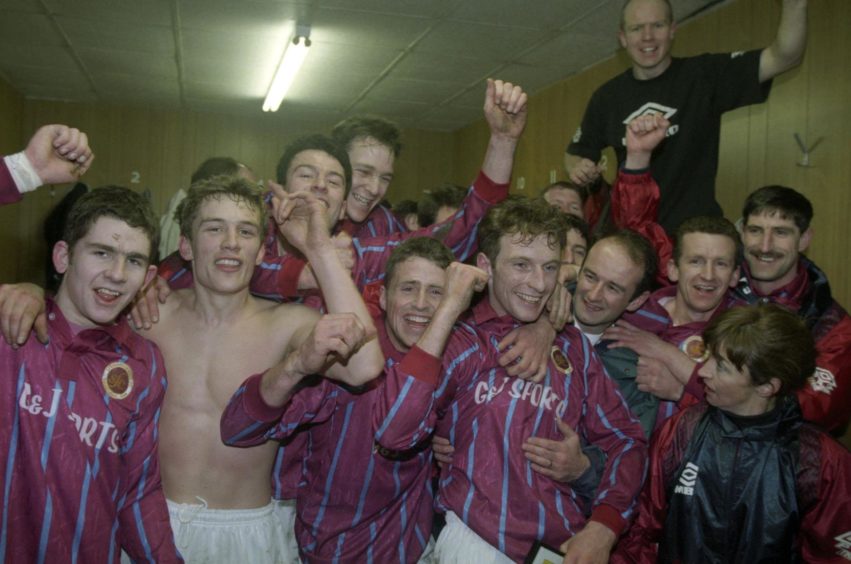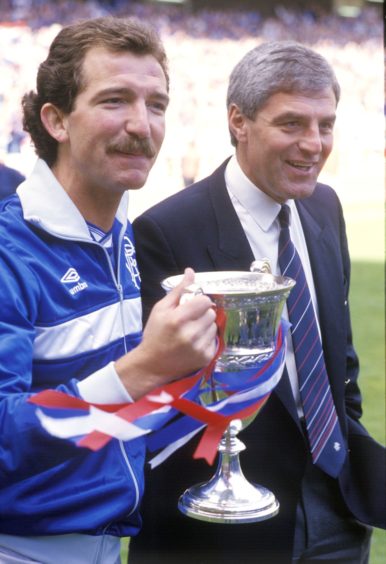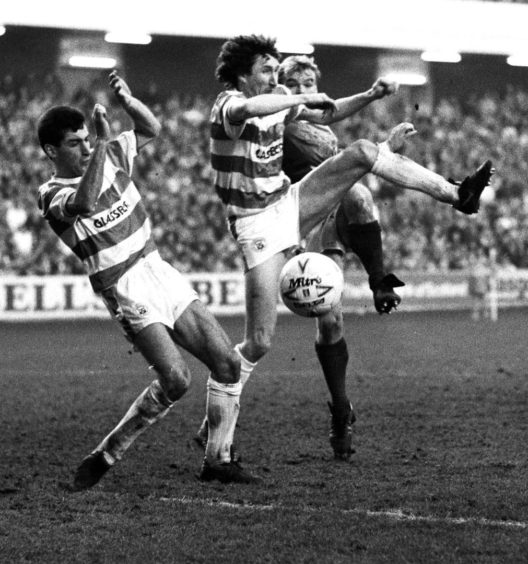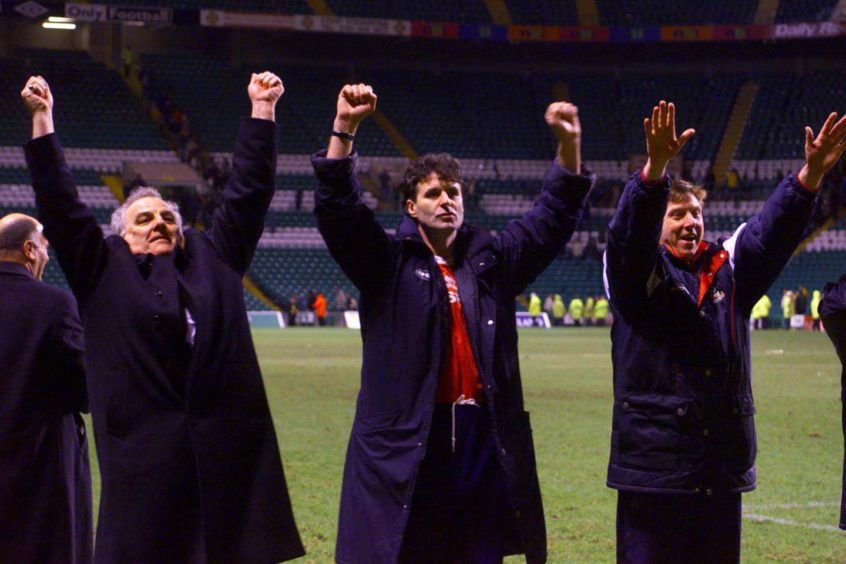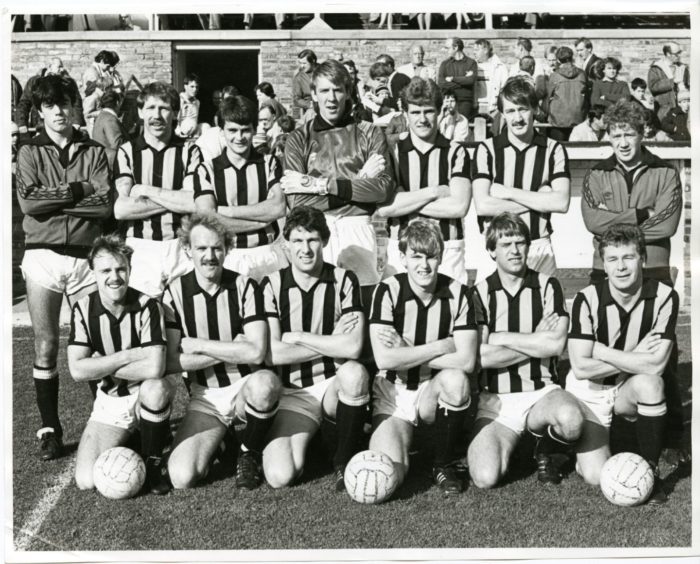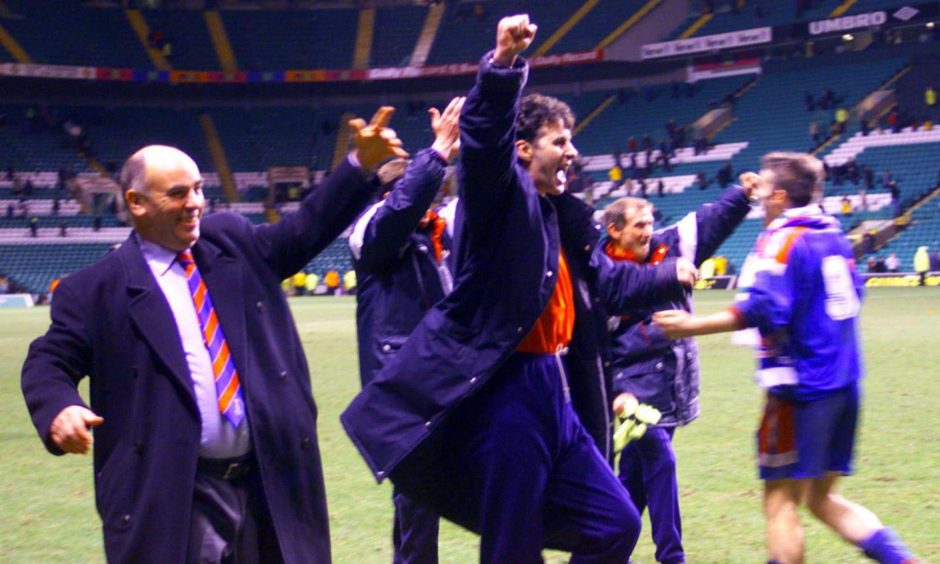
It was a result which prompted shock and astonishment across the football world: Highland League club Brora Rangers’ 2-1 victory against Hearts in the second round of the Scottish Cup last week.
The outcome, which understandably sparked feverish celebrations among the Brora community, was a reminder of the power of knock-out competitions to deliver against-the-odds triumphs for little-league organisations against higher-ranked opponents.
Hearts manager Robbie Neilson described the defeat as “an embarrassment”, but that didn’t do justice to the lung-bursting efforts of the Highland side, who have been prevented from playing football for most of 2021 because of Covid restrictions and lockdown, a state of affairs which made the proceedings doubly remarkable.
As Brora manager Steven Mackay said: “In a normal season, this would be an astronomical result, but you throw in the circumstances that surrounded this game.
“We haven’t played since the first week in January, we’ve had just five training sessions and one friendly and that’s it. We had no right whatsoever to win this game. I am just so privileged to be manager of such an incredible team.”
However, the Scottish Cup has a habit of orchestrating stories with more twists than an Alfred Hitchcock movie. And there have been similar horrific tales from the crypt for other leading luminaries on the domestic circuit.
Supporters might wish to avert their gaze from some of the following scenes as we enter the sport’s very own Twilight Zone.
The Dons crashed and burned at Stenhousemuir
1995: Stenhousemuir 2 Aberdeen 0.
Nobody saw this coming, not even the home team at Ochilview who were 200-1 outsiders for the Cup and were pitted against a Dons line-up who may have been battling relegation, but were expected to dominate matters at a boggy Ochilview.
Former Celtic star Roy Aitken had just stepped into the manager’s role at Pittodrie, and launched his reign with a home win against Rangers, but if he was hoping for a honeymoon period, this sorry debacle soon dashed that idea.
Dairy farmer Tommy Steele – yes, there were plenty of references to the musical impresario at the time – pushed his side in front, then as the crowd roared their enthusiasm while the visitors desperately chased an equaliser, he repeated the dose from a corner and there was no way back for the north-east club which, just a decade earlier, had made a habit of winning major trophies.
It was a sickening blow for Aberdeen and their pain wasn’t over when the final whistle reverberated. Instead, as veteran striker Duncan Shearer recalled, he and his team mates were given the message they least wanted to hear from their new gaffer.
He said: “Roy Aitken popped his head around the door and barked: ‘Congratulations on being part of Aberdeen’s worst result in the club’s history’.
“There was nothing else to say.”
And one of those who celebrated the victory was a certain Adrian Sprott.
Pain for Souness and Co at Ibrox against Hamilton
1987: Rangers 0 Hamilton Academical 1.
Graeme Souness had arrived at Ibrox, charged with transforming the fortunes of the Glasgow giants and ending a stagnant chapter in their history.
The former Liverpool captain had signed some serious big-name talent, including Terry Butcher and Chris Woods and they had already won the League Cup, beating Celtic in the final, even as Hamilton were languishing in the relegation zone.
Nobody gave the latter a prayer, but they had John Lambie as their manager – one of the great extrovert characters in the game, with a passion for pigeons, panatella cigars and advising a physios who was dealing with a concussed player: “Tell him he’s Pele”.
They travelled to Ibrox with the knowledge that Woods hadn’t conceded a goal in 1,196 minutes of play – a British record – but the England maestro lost that distinction when Adrian Sprott popped up to put the underdogs in front in the 70th minute and induce consternation among the majority of the 35,000 crowd.
It was almost 20 years to the day since Berwick had infamously knocked Rangers out of the same tournament, yet there was still time for the hosts to regain momentum. However, no matter how much they huffed and puffed, the Hamilton rearguard stood firm even as the tension cranked up at the end.
Sprott said later: “I’m not sure how I came to be in the Rangers box, it certainly wasn’t in the game plan. I can only think, marking Robert Fleck, that we just drifted into the Rangers half and I ended up losing him and found myself in the box.
“I recall that we had a free kick on the main stand side of the pitch near the half way line. [Hamilton captain] Gerry Collins took it. It was a long ball into the Rangers box, where Dave McPherson, who was under no pressure and trying to keep possession, took his eye off the ball and it found its way into my path.
“I struck it well with my left foot across Woods, and the rest, as they say, is history.”
‘Super Caley Go Ballistic, Celtic are Atrocious’
2000: Celtic 1 Inverness Caley 3.
It’s not just one of the most noted headlines in football history; but it’s also a reminder of how swiftly the rug can be pulled from under your feet as a football manager.
Liverpool great John Barnes had arrived at Parkhead with plaudits ringing in his ears in 1999. However, it was resounding sound of boos and derision which led to him exiting the club after the visitors gained a thoroughly-deserved victory in Glasgow.
It took just 16 minutes for Barry Wilson to put the visitors ahead with a well-taken header from a cross delivered by [Aberdeen’s interim manager], Paul Sheerin.
Mark Burchill scored a minute later to briefly restore equilibrium, but Lubomir Moravcik gifted Caley the lead by deflecting Bobby Mann’s header past his own keeper. And the ubiquitous Sheerin subsequently put the tie beyond any doubt 10 minutes into the second half by calmly slotting a penalty.
After the match, Caley boss Steve Paterson said: “This was no fluke. The players were magnificent out there and deserved to win – there is no question about that.
“It was an unbelievable occasion and it was a magnificent day for the club. I think this is the moment you can safely say that Inverness have arrived in Scottish football.”
The reaction from Celtic was entirely predictable with Barnes being sacked, just eight months and 29 games after his feted arrival in Glasgow.
East Fife dump Hibs out of the tournament
1984: East Fife 2 Hibs 0.
There was no sunshine on Leith when the Fifers came calling and held the home team to a draw when the rivals met in the third round of the Scottish Cup.
Yet there was even greater misery in store when the Bayview club bossed the replay and became the first team from the bottom league to have bested a Premier Division side since league reconstruction in 1975.
Nobody could possibly complain about the outcome. Dave Clarke’s stalwart personnel went ahead in the first half through Tom McCafferty, and despite a series of heroics from Scotland goalkeeper Alan Rough – who was found after the game to have suffered a broken ankle – the pressure was relentless on the visitors.
Eventually, Stevie Kirk rose to bullet a powerful header into the net for the second decisive goal and the home supporters rose to acclaim a terrific performance.
As Rough said later: “Sometimes, you just have to take your hat off to the other team and admit they were better than you. That was definitely true of East Fife.”
Strachan was the star for the Broch
1959: Fraserburgh 1 Dundee 0
In some respects, this was an even more extraordinary outcome than that achieved by Brora, given the quality of the Dens Park collective in the 1950s.
Dundee eventually finished the season in fourth place in the First Division, and were just three years away from winning the Scottish championship title.
But, pitted against the Broch they were victims of arguably the greatest Scottish Cup shock to that point. The home side scored just a minute before the interval, and hung on resolutely and resiliently for the most famous victory of their lives – and the maiden Highland League success against top-tier opponents – despite a late onslaught.
Fraserburgh, who performed with admirable brio, were dependent on the efforts of part-time players and included a plumber, a baker and a shoemaker in their ranks.
The scorer of the winner was Johnny Strachan, a gas board clerk.
But it was Dundee’s gas which was at a peep by the finish.
